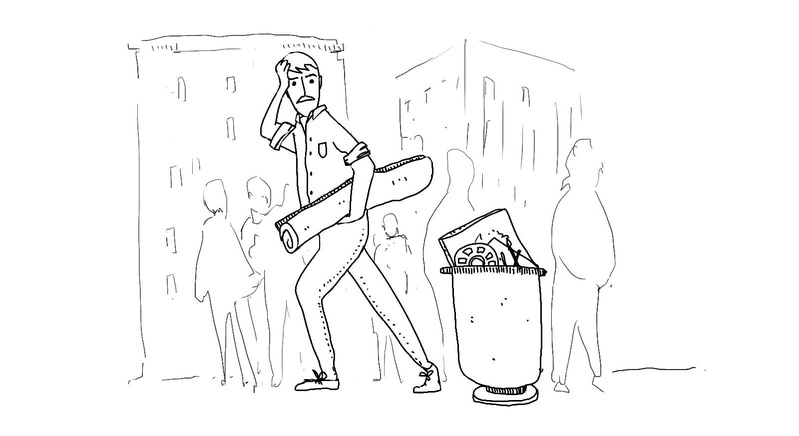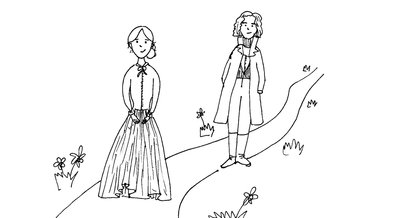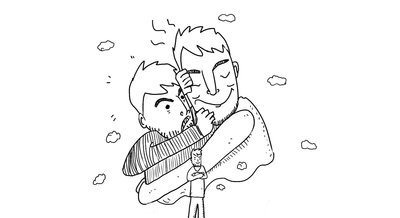Hello me,
Don’t worry, this isn’t an advice letter. This isn’t about how to live your life - you wouldn’t listen anyway - you are too headstrong and insecure for that. You will make the best decisions with the tools at hand. In time, you will gain grace and patience, which will help you develop new tools and teach you to make better use of the ones you have. You have a good heart, which you will find is your most important asset.
My wish for you is that you could be less hard on yourself and that you would care less about what people say. It will cause you much pain, but fortunately, due to passion and determination, you will plow on and have a great life, with the odd hiccup here and there.
It is July 2nd, 1969 and you have just turned twenty-five. You are in Toronto trying to get a job in the film business while working in the art department of a small advertising agency doing paste-ups (you are the world’s worst). On the weekends, you hitchhike back to London, Ontario, where your wife and the two children live.
Your dream of making it in the film business is about to be dashed, but you are not new to having your dreams adjusted. At seventeen, your hope of going to art college and making your way as an artist evaporates, when you find out that you are going to be a father. By nineteen, you and your wife have two children and you have gone back to finish high school, while your wife (who is five years older) works as a nurse.
Through all of this, you continue to paint with whatever time you can steal. Then this idea strikes you: you could stay home and look after the kids while you continue to paint and your wife works at the hospital. Then when you are able to earn a living as an artist, your wife won’t have to carry the burden of supporting the family. Excited, you tell your wife. Less enthusiastic, she says, “You’re dreaming, get a job!”. So you did.
It was just before your twentieth birthday when you landed a job as an illustrator at the T. Eaton Company. It was short-lived because you didn’t like people telling you how to draw. It wouldn’t be the last time your creative integrity made itself felt. You switched jobs and became a designer at the Robert Simpson Company. By twenty-two, you had moved on to the London Free Press, in charge of house advertising.
Life was good. You were happy at work, the family was thriving and you could still paint. You even got a couple of commissions. You had bought an old Jaguar (which died every time it went through a puddle). Little did you know that life was about to change.
“How the hell do you create a TV commercial?” You asked your buddy after you had been asked to create a TV commercial for the newspaper. You kicked ideas around until they bought one, but there was a hiccup. The newspaper wouldn’t pay the fee quoted by a local production company. Without thinking of the consequences, you suggested that the newspaper buy a used camera and you would shoot the commercial. They bought the camera and told you to go to the TV station, which they owned, and get the film and processing.
The news cameramen had a good laugh when you told them what you were about to do. They threw you a reel of film and told you to shoot it and they would tell you what you did wrong. They also gave you a box of old TV commercials and showed you the editing room and told you to start cutting. With your head spinning, you dove in head first. In a month, you shot your first commercial. Thirty-two more would follow, not including the freelance film work. Those were the heady days of the sixties where anything went and you took every advantage of it.
Within a year, you are partners in a small film company where you do everything except the sound. It was a wild ride for a couple of years, but soon, the practical demands of having a family force you to leave London and go to Toronto and try to get a paying job in the film business. How hard could it be? You have experience and a reel.
It is 1969, and the seventies are six months away. You have turned twenty-five and after months of outright rejection, you now know how hard it can be. You are sleeping on the floor of advertising agency after everyone has left. All the money is needed at home and you live on coffee and soup from the drink machine with the occasional lunch and dinner as the creative director’s guest. The fact is that you may not have survived as long as you do without his generosity, support and belief in you. He is tough and brings you to tears on more than one occasion, as he keeps telling you to “grasp the nettle”.
How long can you hang on before you have to pack up and go back to London is the ever present question. You give yourself one more week. The words have barely settled in your mind when you get wind of an art director’s job at big advertising agency. With nothing to lose, you make the call and get an appointment. Much to your surprise, you get the job on the spot. Walking back to work to call your wife and give notice, your emotions oscillate between elation and relief to loss and sadness. As you toss your reel into a nearby trash can, with a loud rattle and clank, another dream bites the dust and you enter a new chapter in your life.
The sixties become the seventies, and as the decade plays out, you will become a very sought-after talent and will win many awards for your art direction, design and illustration. You will become head of the Toronto Art Directors Club, and near the end of the seventies, you will have a year in Germany as creative director. It is there that you will gain much need emotional maturity. While your career continues to blossom, your marriage will wilt, and after fifteen years of marriage, it will end. The guilt of a failed marriage will haunt you for several years, even though you will meet the love your life and it will be proof that life does have a sense of humor. Her name will be same as your ex-wife’s.
The two of you will be soul mates, though as in most marriages, there will be ups and downs. Your relationship will grow deeper by the day and be rich with memories. You will be blessed (at times questionably) with three children, all girls. Your grandchildren will also be all girls. You will form few but lasting friendships that will be with you most of life or at least as far as I can see.
In 1984, a film production company will ask you if you would be interested in being one of their directors. You will decline the offer. Times are good. You and your best friend are partners. The family is growing and happy and you will even able to get back into painting. Why change? You don’t give it another thought.
Not taking no for an answer, the production company will wait until you and your partner create a commercial that you will not have the budget for. They will offer to make the money work out if you direct the commercial. You will agree and you will not only direct the commercial, but you will wake up that dream you thought had died in the bottom of a trash can those many years ago. Within a few months you will leave your partner and the agency business and become a film director, taking a large pay cut as you do.
The return to film will not be a return to where you left off, but surprisingly, it will start with acting lessons. Not because you want to be an actor or for any lofty reason, it will simply be to overcome your shyness and to learn how to talk and work with actors. Regardless of the motivation, it will work better than you could imagine. Over the next twenty-seven years you will thrive, becoming known for your strength of storytelling and for the performance in your work.
From a successful beginning in Canada, you will find yourself working in the USA by 1989. The work will increase to the point that, in 1991, you and the family will move to Los Angeles. No sooner are you settled in LA, much to the chagrin of your wife, will you be shooting globally. Because of that, combined with a huge earthquake that will hit Los Angeles, you decide to return to home while you continue to work internationally.
By the mid-nineties, you will have moved to a production company based in New York and you will stay there until you retire. During that time, you will satisfy a dream to direct a feature film and write the screenplay. Though it won’t be your dream film, and at times painful and disappointing, the process of making the film (with a generous cast and crew) will be a dream come true. You won’t make another feature but you will write a couple more screenplays. Then you will say enough is enough, thankful for the experience while it lasts. You continue to direct commercials.
Through the twenty-seven years you will spend as a film director, working with all of the wonderfully talented crews and actors, it will be your wife that you will owe the biggest debt of gratitude. Without her and her sacrifices, none of what you will be able to experience and achieve will be possible. Even if it would be possible, it would be empty without her love and support.
You will come to a point where the work you loved so much will become a cancer. Though it will provide you and your family a wonderful life, the price you and your family have to pay will no longer be worth it. The cancer will in fact not only be figurative but real. You will get prostate cancer. You and your wife will deal with it head on, on your own terms.
The work becomes a chore. It will be the kind of work that, a few years earlier, you would have turned down, but here you are, stressed and frustrated. Working under some false sense of duty and loyalty. It won’t be until you are casting in London, England, that it all comes crashing down on you. It’s midday and you are standing in Regent Street, calling your wife. At the sound of her voice, you break into tears. You will struggle to get hold of your emotions and suddenly, as if from the depths of your soul, comes: “I can’t do this anymore.”
Shortly after that tearful day, you will walk away from the film business. This time, there will be no sadness. You will be walking back into the dream you had as a young man, to be a painter.
The sun is glistening off the lake, a couple of paintings wait to be finished in the studio, as I sit here at sixty-nine writing to you, myself at twenty-five. As I pour over my life, which one day will be your life, lived, I feel very blessed and humbled and loved. Sure, there are plenty of things I would gladly take back (even feel ashamed of) but I wouldn’t have it (my life) any other way, even the cancer. If anything were to change, I would be telling a different story and I love the one I have. I hope you feel the same when you get here and are writing to your twenty-five year old self.
A few words of advice (though I said I wasn’t going give any): keep an open mind and keep laughter in your heart, even when there are tears of pain are streaming down your cheeks. Life is a gift not to waste, not even a second.
I love you, enjoy the ride...
Myself at 69
January 2014


